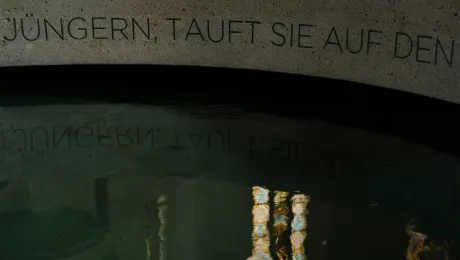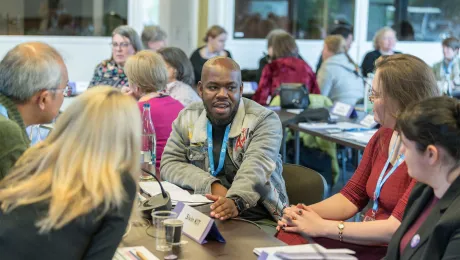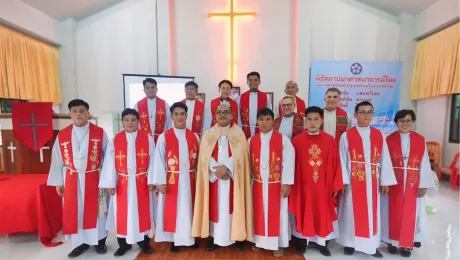LWF’s President and General Secretary are in Bratislava for the first Church Leadership Consultation in the Central Eastern Europe since the pandemic, focusing on the church’s role in promoting peace and reconciliation in the context of the war in Ukraine.
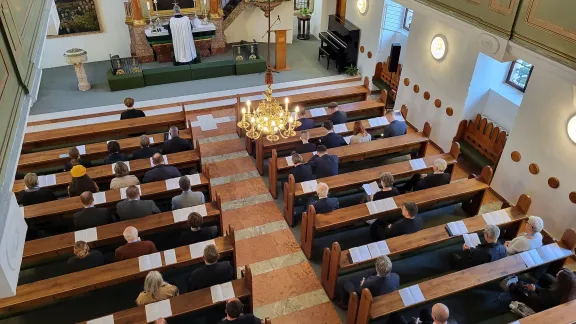
General Bishop Ivan El’ko of the Evangelical Church of the Augsburg Confession in the Slovak Republic leads delegates from Central and Eastern Europe for opening worship of their church leadership consultation. All Photos: ECAC SR/Jana Nunvárová
Church leadership consultation in Bratislava focuses on response to Ukraine crisis and 2023 Krakow Assembly
(LWI) - As conflict continues to force thousands of Ukrainians to flee from their country each day, Lutheran leaders from across the Central Eastern European region are meeting in neighboring Slovakia this week to discuss the church’s role in promoting peace and reconciliation. Representatives from most of the 16 churches in the region are gathered in Bratislava from 19 to 21 October for their first in-person leadership consultation since the start of the COVID-19 pandemic.
The response of their churches to the Ukraine crisis is high on the agenda, alongside a focus on the Thirteenth Lutheran World Federation (LWF) Assembly to be held in Poland next year. That event will mark only the second time, since its foundation 75 years ago, that the LWF’s highest decision-making body has met in this region.
Addressing delegates gathered at the opening session, LWF President Archbishop Dr. Panti Filibus Musa reflected on the growing challenges of conflict, inequality, religious nationalism, climate change, human rights violations and the mass displacement of people, as well as the ongoing effects of the pandemic in many parts of the globe. This list of problems “seems to grow each day,” he said, “challenging us to dig deep into the wells of our spiritual, theological and ethical resources to respond adequately.
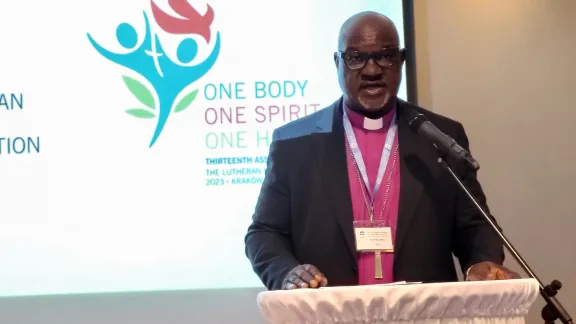
LWF President Archbishop Dr. Panti Filibus Musa addresses the leadership consultation on the role of the churches in peacebuilding and reconciliation. Photo: ECAC SR/Jana Nunvárová
The church is called “to engage in the public square both confidently and courageously,” he said, but at the same time “we equally need to address the voices within our own ranks when human dignity is questioned, when religion is being instrumentalized to serve political ends, or when we see church members helping to multiply public lies.”
Acting with courage, clarity and humility, Archbishop Musa said, church leaders must “stand up against any kind of propaganda that aims at demonizing others and calls for more authoritarian leadership.” He noted that the words of the LWF documents Resisting exclusion and The Church in the Public Space are increasingly relevant “as we are confronted with religious voices that justify war and violence, or political voices that instrumentalize religion to divide people.”
The LWF leader stressed that Lutheran churches in Eastern Europe “have a distinct gift to share with the wider communion and society,” since they learnt under decades of Communist rule how to “live out the Christian faith with resilience and persistence.” In the years following World War II in this region, he continued, churches were also pioneers of Polish-German reconciliation, calling for forgiveness and recognition of mutual borders “even before politicians made symbolic gestures.”
Key role of young people as peacemakers
The Nigerian archbishop also highlighted “the important role of young people” as messengers of peace and reconciliation. He pointed to an LWF-supported youth project in his own country where farmers and herdsmen have been brought together on neutral ground to discuss the root causes of clashes between them. Initiated by young Lutherans, he noted, the project has also brought on board Muslim partners to work together for peace and reconciliation.
LWF’s General Secretary Rev. Anne Burghardt also addressed the opening session, speaking of ways in which the global communion seeks to “put our words into deeds” as it participates in God’s holistic mission. She looked back at the history of the LWF and its predecessor, the Lutheran World Convention, seeking to bring Christians together and forge closer relationships between Lutheran churches in different parts of the world.
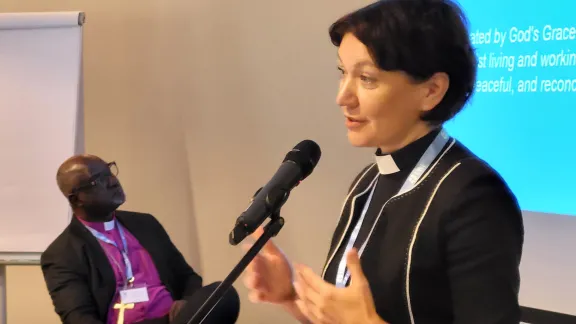
LWF General Secretary Rev. Anne Burghardt addresses the leadership consultation in Bratislava. Photo: ECAC SR/Jana Nunvárová
While the demographics of the Lutheran world have shifted significantly towards the Global South, she stressed that the LWF’s four founding pillars of “rescue for the needy, joint efforts in theology, shared witness to ecumenical unity [and] common initiatives in mission” remain the same. Despite the growing challenges of our current contexts, she insisted, the LWF continues to be guided by its vision statement: ‘Liberated by God’s grace, a communion in Christ living and working together for a just, peaceful and reconciled world.’
We must be messengers of hope and reconciliation among our constituencies, ecumenically and in our societies.
LWF General Secretary Rev. Anne Burghardt
Burghardt shared examples of the way in which the LWF is working to put that vision into practice, such as its COVID-Rapid Response Fund, its advocacy for climate justice and its programs to combat violence against women and girls which has been described as a “shadow pandemic.” the LWF has “a long-standing commitment to gender justice out of the conviction that God sees all people, regardless of gender, as His beloved children.” Similarly, it has a “clear commitment to women’s ordination” which was first affirmed back in 1984.
In today’s polarized world, the General Secretary said, “we need to make sure that we draw from the riches of our theological tradition” to counter simplistic approaches that divide the world into 'friends or enemies’. “We must be messengers of hope and reconciliation among our constituencies, ecumenically, and in our societies,” she insisted, offering "a shared space for people with different and contradicting political interests and convictions.” This can only happen, she concluded “if we put Christ in the center. Moving closer to him also means that we move closer to each other.”
